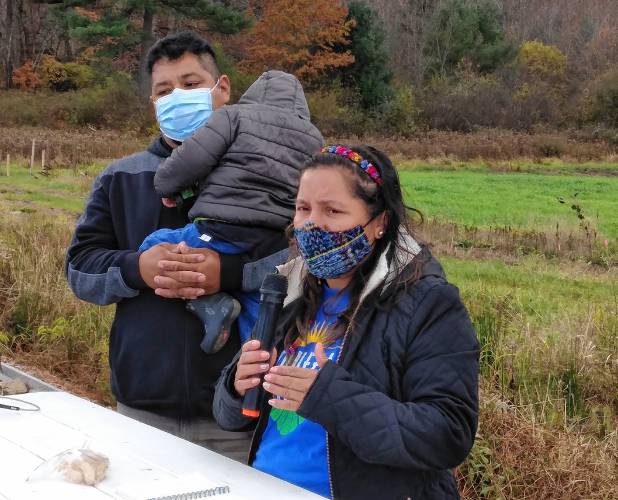
November 5, 2021
‘We’re only asking for better conditions’: Advocates push for passage of Fairness for Farmworkers Act
BY The Daily Hampshire Gazette
HATFIELD — Longtime farmworkers and co-owners of Riquezas del Campos Farm, Audi Gonzalez and Marcelino Martinez have experienced firsthand the mistreatment people working on farms can endure, from long hours in the fields and no overtime pay to below minimum wage and lack of sick time.
“We’re happy to work hard, so long as it’s humane,” Gonzalez said during a Thursday afternoon press conference at the Pioneer Valley Workers Center’s La Colmena Community Farm on Linseed Road, where Riquezas is located. “We’re only asking for better conditions. It’s as simple as that.”
Martinez, who has been a farm laborer for nearly 20 years, said there is a beautiful process to get harvests from fields to tables. But he expressed sadness that farmworkers have to work every day, often missing occasions like their children’s birthdays. During the COVID-19 pandemic, he said, they have not always had good access to masks, gloves and hand sanitizer.
“They treat us like machines,” Martinez said. “They want us to keep going and going and going.”
For the Fairness for Farmworkers Coalition, with member groups including the Workers Center, the Center West Justice Center, the Massachusetts Law Reform Institute, and the ACLU of Massachusetts, some of these problems can be addressed through passage of a new bill in the state Legislature, the Fairness for Farmworkers Act. That bill will be heard before the Joint Committee for Labor and Workforce Development Tuesday at 10:30 a.m.
The legislation would guarantee that the subminimum wage of $8 per hour for farmworkers is raised to the state minimum wage of $13.50 per hour, that an optional day of rest, paid at time-and-a-half to those who work, is offered to farmworkers, and that overtime pay comes after 55 hours of labor in a week for seasonal farmworkers.
“This new bill will protect people who work our fields and feed our families,” said Hodaliz Borrayes, a community organizer who served as emcee of the press conference.
Sen. Adam Gomez, D-Springfield, who filed the legislation, said many of the farmworkers in the Pioneer Valley live in his district and in Hampden County, and that the pandemic has made clear farmworkers are essential. Gomez said the bill is about promoting human rights and human dignity.
As a youth, working in tobacco fields in Connecticut, Gomez said he saw how farmers would divide those who could speak English and those who couldn’t, as a way to take their power.
Gomez thanked the City Council in Northampton for its support of his bill, along with co-sponsor Rep. Carlos Gonzalez, D-Springfield, along with supporters Sen Adam Hinds, D-Pittsfield, and Rep. Paul Mark, D-Peru.
There are about 13,000 farmworkers at the state’s 7,000 or so farms, said Claudia Quintero, staff attorney for the Migrant and Seasonal Farmworkers Project at the Central West Justice Center. About one-third are facing dire situations, which shouldn’t exist in a state that claims progressive values, she said.
“The time has come to recognize the invaluable contributions farmworkers make to the Massachusetts economy, abolish the $8 substandard minimum wage that has kept farmworkers impoverished, and allow these workers to earn overtime,” Quintero said.
Claudia Rosales, co-director of the Workers Center, said it is unfair to farmworkers to be treated poorly, having at times no access to potable water or bathrooms, no sick days and no compensation for injuries suffered on the job.
“This is deeply unjust because they’re human beings like all of us,” Rosales said, adding that the bill could set an example for other states across the country.
The national exclusion of farmworkers from state and federal wage-and-hour laws traces back to the New Deal legislation under President Franklin Roosevelt, said William Newman, director of the Western Massachusetts Law office of the ACLU. “It’s time for there to be fairness for farmworkers,” Newman said.
Dr. Marty Nathan of Northampton, who has assisted the medical needs of farmworkers for 26 years, said they can endure frequently brutal work conditions, with exposures to dust, pesticides and heavy machinery, and often put off doctor visits, meaning she has seen people with very high blood sugar levels and suffering from kidney stones.
“This bill is necessary for a commonwealth with a conscience that is dedicated to the health of the public,” Nathan said.
Just a short distance away from the farm is the River Valley Co-op. Its general manager, Rochelle Prunty, said the industrialized food system has created more poverty and exploitation of farmworkers.
“Everything we can do to support local farmworkers, local farms and alternatives to industrialized food systems, is a step in the right direction,” Prunty said.
Two women, who only identified themselves by their first names Amabilia and Octavia, also spoke about their situations as farmworkers.
Amabilia, who lives in Springfield, said she contracted COVID-19 but had no opportunity for sick time.
“They don’t pay overtime, they don’t clean the bathrooms, we don’t have access to wash stations,” Amabilia said, with hopes the bill will rectify this. “It would be just because we work really, really hard.”
Scott Merzbach can be reached at smerzbach@gazettenet.com.
